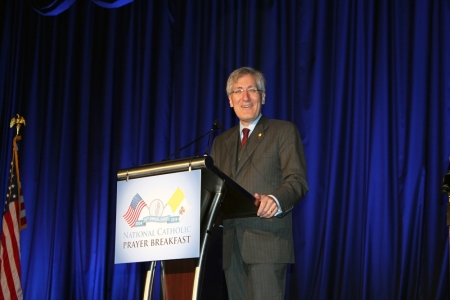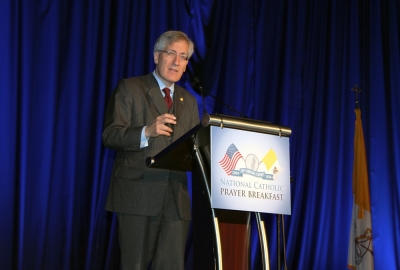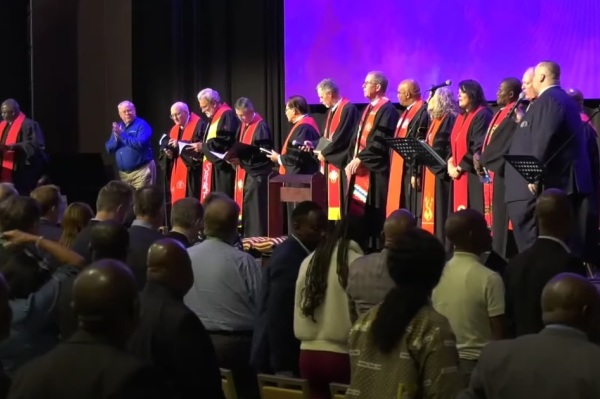Ashamed of the Gospel?
Editor's Note: The following remarks were delivered at the National Catholic Prayer Breakfast on May 13, 2014. For Christian Post coverage of the speech, see here and here. For video of the speech, watch part one here and part two here.
The days of socially acceptable Christianity are over. The days of comfortable Catholicism are past. It is no longer easy to be a faithful Christian, a good Catholic, an authentic witness to the truths of the Gospel. A price is demanded and must be paid. There are costs of discipleship — heavy costs, costs that are burdensome and painful to bear.

Of course, one can still safely identify oneself as a "Catholic," and even be seen going to mass. That is because the guardians of those norms of cultural orthodoxy that we have come to call "political correctness" do not assume that identifying as "Catholic" or going to mass necessarily means that one actually believes what the Church teaches on issues such as marriage and sexual morality and the sanctity of human life.
And if one in fact does not believe what the Church teaches, or, for now at least, even if one does believe those teachings but is prepared to be completely silent about them, one is safe — one can still be a comfortable Catholic. In other words, a tame Catholic, a Catholic who is ashamed of the Gospel, or who is willing to act publicly as if he or she were ashamed, is still socially acceptable. But a Catholic who makes it clear that he or she is not ashamed is in for a rough go — he or she must be prepared to take risks and make sacrifices.
"If," Jesus said, "anyone wants to be my disciple, let him take up his cross and follow me."
We American Catholics, having become comfortable, have forgotten, or ignored, that timeless Gospel truth. There will be no ignoring it now. The question each of us today must face is this: Am I ashamed of the Gospel?

And that question opens others: Am I prepared to pay the price that will be demanded if I refuse to be ashamed, if, in other words, I am prepared to give public witness to the massively politically incorrect truths of the Gospel, truths that the mandarins of an elite culture shaped by the dogmas of expressive individualism and me-generation liberalism do not wish to hear spoken? Or, put more simply, am I willing, or am I, in the end, unwilling, to take up my cross and follow Christ?
Powerful forces and currents in our society press us to be ashamed of the Gospel — ashamed of the good, ashamed of our faith's teachings on the sanctity of human life in all stages and conditions, ashamed of our faith's teachings on marriage as the conjugal union of husband and wife. These forces insist that the Church's teachings are out of date, retrograde, insensitive, uncompassionate, illiberal, bigoted, even hateful. These currents bring pressure on all of us, and on young Catholics in particular, to yield to this insistence. They threaten us with consequences if we refuse to call what is good evil, and what is evil good. They command us to conform our thinking to their orthodoxy, or else say nothing at all.
Do you believe, as I believe, that every member of the human family, irrespective of age or size or stage of development or condition of dependency, is the bearer of inherent dignity and an equal right to life? Do you hold that the precious child in the womb, as a creature made in the very image and likeness of God, deserves respect and protection? Then, powerful people and institutions say, you are a misogynist, a hater of women, someone who poses a threat to people's privacy, an enemy of women's "reproductive freedom." You ought to be ashamed!
Do you believe, as I believe, that the core social function of marriage is to unite a man and woman as husband and wife to be mother and father to children born of their union? Do you hold, as I hold, that the norms that shape marriage as a truly conjugal partnership are grounded in its procreative nature — its singular aptness for the project of child-rearing? Do you understand marriage as the uniquely comprehensive type of bond — comprehensive in that it unites spouses in a bodily way and not merely at the level of hearts and minds — that is oriented to and would naturally be fulfilled by their conceiving and rearing children together? Then these same forces say you are a homophobe, a bigot, someone who doesn't believe in equality. You even represent a threat to people's safety. You ought to be ashamed!
But, of course, what you believe, if you believe these things, is a crucial part of the Gospel. You believe the truth, in its fullness, about the dignity of the human person and the nature of marriage and sexual morality as proclaimed by the Church — our only secure source of understanding the Gospel message. So when you are invited to distance yourself from these teachings or go silent about them, when you are threatened with opprobrium or the loss of professional opportunities or social standing if you do not, you are being pressured to be ashamed of the Gospel, which means to give up faith in the Lordship of Christ and hope in the triumph of goodness, righteousness, and love in and through Him.
To be a witness to the Gospel today is to make oneself a marked man or woman. It is to expose oneself to scorn and reproach. To unashamedly proclaim the Gospel in its fullness is to place in jeopardy one's security, one's personal aspirations and ambitions, the peace and tranquility one enjoys, one's standing in polite society. One may in consequence of one's public witness be discriminated against and denied educational opportunities and the prestigious credentials they may offer; one may lose valuable opportunities for employment and professional advancement; one may be excluded from worldly recognition and honors of various sorts; one's witness may even cost one treasured friendships. It may produce familial discord and even alienation from family members. Yes, there are costs of discipleship — heavy costs.
There was a time, not long ago, when things were quite different. Of course, there have always been anti-Catholic currents in sectors of American society. And at certain times and in certain circumstances and places one paid a price for being a Catholic. But as the nation progressed, anti-Catholicism in many sectors dissipated and one could be a true and faithful Catholic without suffering significantly in terms of lost opportunities or standing in the community. Biblical and natural law beliefs about morality were culturally normative; they were not challenges to cultural norms. But those days are gone. What was once normative is now regarded as heretical—the moral and cultural equivalent of treason.
And so, here we are. You see, for us, as for our faithful Evangelical friends, it is now Good Friday. The memory of Jesus's triumphal entry into Jerusalem has faded. Yes, he had been greeted, and not long ago, by throngs of people waving palm branches and shouting "Hosanna to the Son of David." He rode into the Jerusalem of Europe and the Jerusalem of the Americas and was proclaimed Lord and King. But all that is now in the past. Friday has come. The love affair with Jesus and his Gospel and his Church is over. Elite sectors of the cultures of Europe and North America no longer welcome his message. "Away with him," they shout. "Give us Barabbas!"
So for us there is no avoiding the question: Am I ashamed of the Gospel? Am I unwilling to stand with Christ by proclaiming His truths? Oh, things were easy on Palm Sunday. Standing with Jesus and His truths was the "in thing" to do. Everybody was shouting "Hosanna." But now it's Friday, and the days of acceptable Christianity are over. The days of comfortable Catholicism are past. Jesus is before Pilate. The crowds are shouting "crucify him." The Lord is being led to Calvary. Jesus is being nailed to the cross.





















